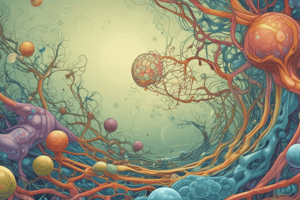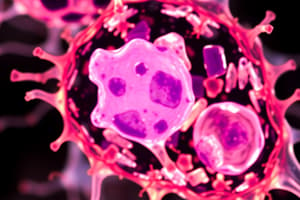Podcast
Questions and Answers
What is a fundamental principle of cell theory?
What is a fundamental principle of cell theory?
- Cells arise spontaneously.
- All living organisms are composed of cells. (correct)
- All cells have a nucleus.
- Only eukaryotic cells have genetic material.
Which of the following correctly describes eukaryotic cells?
Which of the following correctly describes eukaryotic cells?
- They are typically larger and more complex than prokaryotic cells. (correct)
- They do not contain a nucleus.
- They lack membrane-bound organelles.
- Their genetic material is found in a nucleoid region.
Which organelle is responsible for ATP production?
Which organelle is responsible for ATP production?
- Endoplasmic Reticulum
- Mitochondria (correct)
- Ribosome
- Golgi Apparatus
In which phase of mitosis do the sister chromatids separate?
In which phase of mitosis do the sister chromatids separate?
What is produced during glycolysis?
What is produced during glycolysis?
What process do plants primarily use to convert light energy into chemical energy?
What process do plants primarily use to convert light energy into chemical energy?
Which of the following is NOT a part of the signal transduction pathway?
Which of the following is NOT a part of the signal transduction pathway?
What is the significance of stem cells?
What is the significance of stem cells?
What is the primary function of the cell membrane?
What is the primary function of the cell membrane?
Flashcards are hidden until you start studying
Study Notes
Cell Biology Study Notes
Cell Theory
- All living organisms are composed of cells.
- The cell is the basic unit of life.
- All cells arise from pre-existing cells.
Types of Cells
-
Prokaryotic Cells
- Lack a nucleus and membrane-bound organelles.
- Smaller and simpler (e.g., bacteria).
- Genetic material is in the nucleoid region.
-
Eukaryotic Cells
- Contain a nucleus and membrane-bound organelles.
- Larger and more complex (e.g., plants, animals, fungi, protists).
- DNA is linear and associated with histones.
Cell Structure
-
Cell Membrane
- Phospholipid bilayer that controls the movement of substances in and out.
- Contains proteins, cholesterol, and carbohydrates.
-
Nucleus
- Contains genetic material (DNA).
- Surrounded by the nuclear envelope.
- Site of transcription and ribosome assembly.
-
Organelles
- Mitochondria: Powerhouse of the cell, site of ATP production.
- Ribosomes: Protein synthesis.
- Endoplasmic Reticulum (ER)
- Rough ER: Studded with ribosomes, involved in protein synthesis.
- Smooth ER: Synthesizes lipids and detoxifies substances.
- Golgi Apparatus: Modifies, sorts, and packages proteins and lipids.
- Lysosomes: Contains digestive enzymes for waste processing.
- Peroxisomes: Break down fatty acids and detoxify harmful substances.
Cell Division
- Mitosis: Process of somatic cell division resulting in two identical daughter cells.
- Phases: Prophase, Metaphase, Anaphase, Telophase.
- Meiosis: Process of gamete formation resulting in four genetically diverse cells.
- Involves two rounds of division (Meiosis I and II).
Cellular Respiration
- Process by which cells convert glucose and oxygen into ATP, carbon dioxide, and water.
- Three stages:
- Glycolysis (cytoplasm)
- Krebs Cycle (mitochondria)
- Electron Transport Chain (mitochondria)
Photosynthesis
- Process by which plants, algae, and some bacteria convert light energy into chemical energy.
- Occurs in chloroplasts.
- Two main stages:
- Light-dependent reactions: Convert sunlight into ATP and NADPH.
- Calvin Cycle: Utilizes ATP and NADPH to synthesize glucose.
Cell Communication
- Signal Transduction Pathways
- Series of molecular events triggered by a signal that leads to a cellular response.
- Includes: Reception, Transduction, Response.
Stem Cells
- Undifferentiated cells with the potential to develop into various cell types.
- Types:
- Embryonic Stem Cells: Pluripotent, can give rise to any cell type.
- Adult Stem Cells: Multipotent, limited to certain cell types.
Biotechnology Applications
- Genetic engineering, CRISPR, cloning, and regenerative medicine.
These notes summarize key concepts in Cell Biology relevant to Biology Honors coursework.
Studying That Suits You
Use AI to generate personalized quizzes and flashcards to suit your learning preferences.




